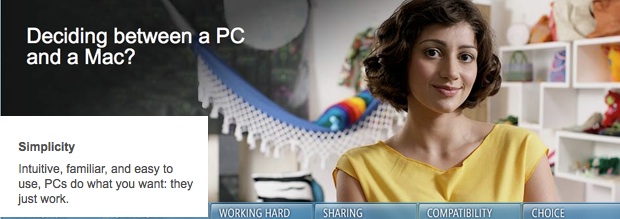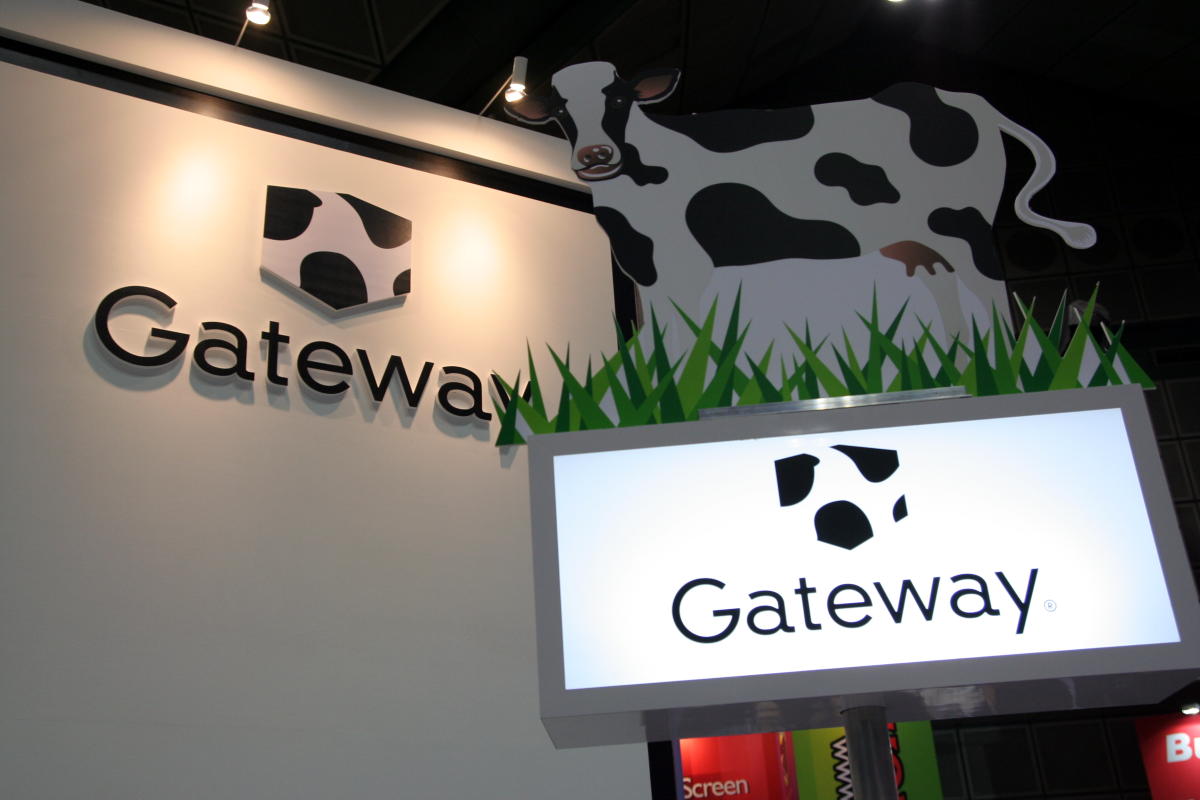Home » Learning Curve
Windows Does Not 'Just Work''When our back's to the wall we'll do anything at all.'
- Microsoft
Fast Company published a short article two days ago about Microsoft's latest anti-Apple FUD campaign. One of the tidbits picked up (missed in yesterday's article 'Stupid Dumb-ass Article from Microsoft on Why Macs are No Good' in The Technological) was that Microsoft stole the well known Apple tag line 'it just works'.

This latest greatest effort by Microsoft happened because their stock dropped dramatically on the news that Global Equities Research's Trip Chowdhry was downgrading their stock. The primary reason given:
'70% of incoming university freshman students are coming with Macs, which is up ~10% - 15% y-y. Microsoft is failing to connect with the new generation of users.'
That's sensational (and encouraging) news, given that only a few years ago Apple were still down in low teen digits.
Fortune followed this up by studying a survey from Student Monitor. The results weren't the same but they were still dramatic. And they weren't, as Fortune put it, anything for Microsoft or Dell to celebrate.
Apple and Dell have now switched positions in the student market in the past five years, reported Fortune: 47% of incoming students were purchasing Dells five years ago; now 47% are purchasing Apple instead.
And so, with disastrous 'sky is falling' statistics and their market cap still tanking, Microsoft take to their patented copycat routine. As always, it's too lame and too late. But claiming Windows 'just works' is perhaps taking things one steamy turd of bullshit too far. Windows will never 'just work'.
Why Macs Just Work
Comparing Apple and Microsoft is like comparing apples and lemons. But consumers see (and compare) only the final products. Apple don't have a completely open system. Their system is still a far cry from Microsoft's which is completely closed. Apple do in fact use an inordinate amount of open source software - but you can't build their system with the code.
And Apple continue to 'bind' their system to their own hardware: you can buy the OS X operating system anywhere but you can't run it on anything but Apple hardware without hacking. This might not go down well with some groups but it does have crucial advantages.
Apple hardware - their laptops, desktops, and mobile devices - is 'turnkey': you don't have to configure much at all. The primary reason for this is Apple need only test their system against their own hardware. Microsoft on the other hand work through lugubrious 'HCTs' - hardware compatibility tests - where they make sure their latest iteration works with the major OEM PCs, lesser known PCs, as well as peripheral devices. This takes a lot of work and the results - even after collaborating together with the OEMs - are never perfect and often unsatisfactory.
Microsoft also have to try to ensure software compatibility: major ISV titles have to work, despite changes in the underlying system. Microsoft spend considerable time documenting their system - which is a good thing - but have to keep control over timelines when APIs were introduced for which versions of the system.
All systems should provide this documentation but with Windows it's even more critical (and prone to error). Even though Microsoft are locked into a doomed system architecture because of their huge ISV market - most ISV titles would break with a better and even marginally more secure operating system - they still make significant changes from one version of Windows to the next. The mess they created in the transition for XP to 'Se7en' is ample indication of this.
Apple don't have to worry about any of that. They make one system and perhaps four basic computers - all in-house design. They can easily test it all. They can time releases of both hardware and software. And they have a much more robust system to start with.
Apple's own applications can also be tested against new iterations. It's all 'in-house' - it just works.
You have to experience it to believe it: the legendary Apple OOTB ('out of the box') experience. All of five minutes (and some gorgeous eye and ear candy Microsoft will never match) and you're connected to the Internet, have your own user account with all your basic directories set up, and can start surfing and sending and receiving mail.
You can't fault Apple for being too 'simple' or 'the rest of us' anymore: their OS X dwarfs Microsoft's Windows in sophistication, complexity, and security. Microsoft wish they could use such a good system (based on FreeBSD open source) but they can't.
Why Windows Does Not 'Just Work'
Windows OEM hardware doesn't go through anything close to the same stringent testing before leaving the factory. Windows OEMs can't afford it. Return rates for Windows PCs are inordinately high. It's only with the extremely high end PCs that you can get quality approaching that of a Mac. But even that's not a given.
Windows OEM manufacturing is tooled for cheap or medium-priced hardware. Apple have only one price and quality level: high. And they stuff everything into those boxen with award-winning design.
Apple can work out kinks in production a lot easier - they have only one version of each product to test and manufacture. Try surfing around a Windows OEM website and see how long it takes before you get lost. Perhaps you saw a 'come on' on the telly for some unbelievably cheap Windows PC. Now try finding it at the website. Good luck.
Windows OEMs have so many products and so many crucially different versions of those products that they can't (and won't) get the production kinks out. Or even try. It's far more sensible for them to ship faulty products and wait for you to complain.
Apple return rates are at the other end of the spectrum: they're the lowest in the industry.
Based on return rates alone - and not even considering the shabby operating system - up to 40% of Windows PCs don't work right out of the box. Apple's return rate is less than half of that. Your odds that anything is going to 'just work' are statistically greater than twice as good as Windows PCs when you have a Mac.
Welcome to Gateway Country
Gateway cows used to proliferate across the US landscape. No more. Gateway had the highest return rate of them all.

This site was created for two reasons. The futility of trying to secure Windows for safe use on the Internet was the first. The original plan was to purchase Windows OEM hardware and run Red Hat Linux. Both the BBC News and The Register tested *nix and reported on it. The Red Hat Diaries project was to take things one step further: offer a 'road map' to procuring, installing, configuring, and running a Linux system. But that didn't work out too well: not because Red Hat Linux isn't good but because Windows OEM hardware is so hopeless.
To start with: it's downright ugly. Best Buy and Circuit City were loaded with abominable (and expensive) eyesores. None of those laptops were meant to last either: they had structural weaknesses and not just a few 'system quirks'.
Sometime in late autumn 2001 it was time (a last resort) to visit a Gateway Country store in the RTP. The store was mostly void of customers. Towards the back was a small table set up with a number of Gateway laptops.
A very appealing salesgirl named Amanda came up to ask if she could help. 'Yes please - show us your top of the line.' Amanda pointed to a huge laptop. The price tag was $3850. 'Can you show us what it can do? Can you play a movie on it?'
Amanda went back to the sales counter and asked for and was given a DVD. She came back and inserted it.
Nothing happened.
Amanda gave up after fiddling with the box a while. A Windows PC that had 'fail' written all over it. Next to the $3850 model sat another for $3500. 'Can we try that one instead?'
Amanda ejected the DVD from the first laptop and inserted it into the other one.
Three programs came up at once to fight for control of the DVD. None of them won.
'Someone Else to Blame'
And that's the other issue with Windows: too many people are involved in its production. Who do you blame if a $3850 laptop doesn't play DVDs? Microsoft will tell you it's the OEM. The OEM will tell you it's Microsoft. Both may tell you it's someone else.
Apple resellers and Apple's own stores are the one-stop place to go if something goes wrong. Your Mac won't play DVDs? That's highly unlikely given Apple's production model but still and all: your Apple shop will deal with it - Apple make it all.
Do the Research
If you're one of the few without a student PC or Mac and want to know what to buy this autumn: do the research. Given the saturation of Macs at your uni, it shouldn't be hard to hook up with Mac owners and get them to show you the system and tell you about their experiences.
Some might be smug snarky 'fanboys' but odds are most are very cool about it and more than happy to show you around. You'll notice how easy they regard computer use. You might want to compare this with what the minority on Windows have to say. And when chatting with these people, don't forget to sneak in the key questions.
- 'Has your system ever been hacked?'
- 'Does that system of yours crash very often?'
- 'What type of antivirus products would you recommend?'
And so forth. Because the bottom line on any computer purchase is the bottom line: how much the whole package costs.
Good MacBooks start at $999 without the student discount; reasonably reliable PC laptops start as low as half that. Now find out what additional purchases are necessary to bring a Windows PC up to the same level of functionality as the Mac.
Getting a PC for half the price of a Mac is useless if you need to invest at least as much again in antivirus and protection software. But that's the way it works: your PC will need thorough maintenance at least twice per year or more. Each of those trips to the reseller is going to cost you perhaps half the price of your original purchase.
- Geek Squad's computer setup costs you $150.
- Geek Squad's security and performance plan costs you $100.
- Geek Squad's computer tune-up costs you $40 (but you have to bring the box in).
- Geek Squad's full antivirus support costs you $300 - $400 if you want data backup.
That's $590 - $690 in additional costs. For that much you can get a second MacBook at student discount rates.
And you're still at great personal risk: Windows is by far the most dangerous computer platform in the world. You could lose additional money if your PC is hacked or your identity is stolen. Both are tangible risks with Windows.
See Also
Apple: MacBook
Radsoft: Red Hat Diaries
Fortune: Big Macs on campus
The Technological: MSFTValue
Learning Curve: A Gullible's Travels
Best of the 2000s: Apple's Get a Mac
Learning Curve: Life Without Windows™
Red Hat Diaries: Lauren De Long's No PC
Hall of Monkeys: Portrait of the Artist as a Young Slut
Red Hat Diaries: CONDOLENCES, LAUREN. IT'S A MISTAKE.
Learning Curve: Microsoft: The Truth and the Consequences
The Technological: That Mystery Man with the Camera Again
Learning Curve: Life Without Windows™: The Bogus Backstory
Fast Company: Microsoft Steal Jobs' Motto for Case Against Apple
|